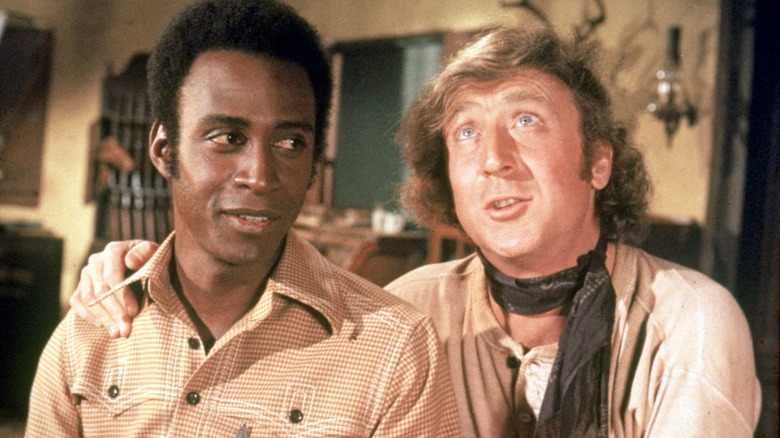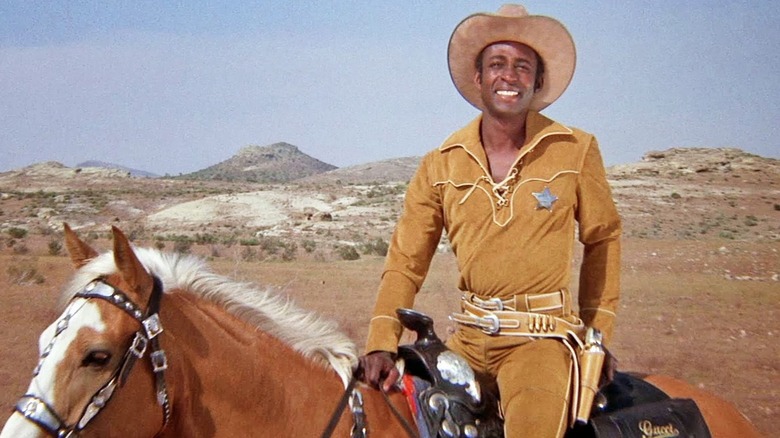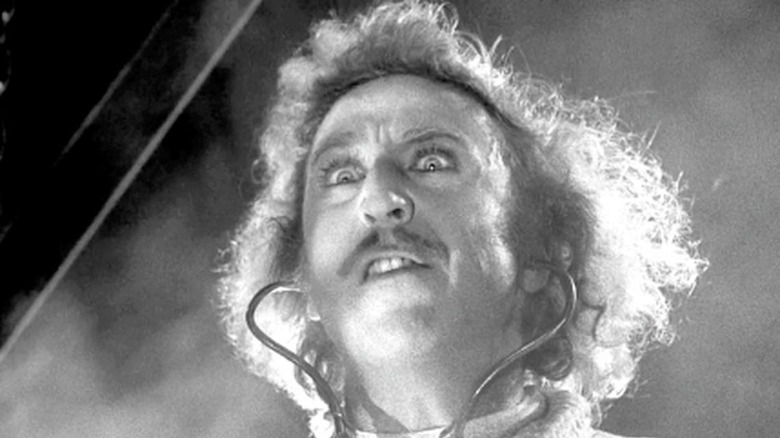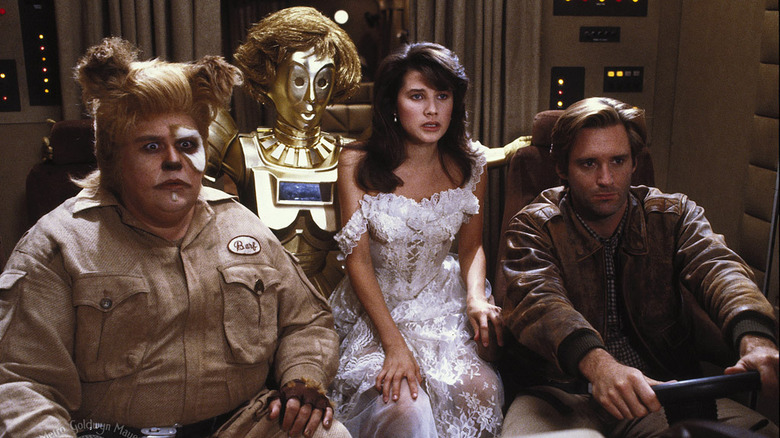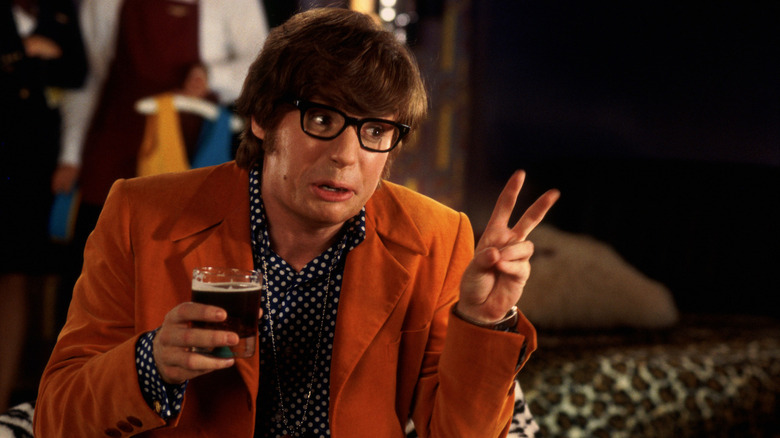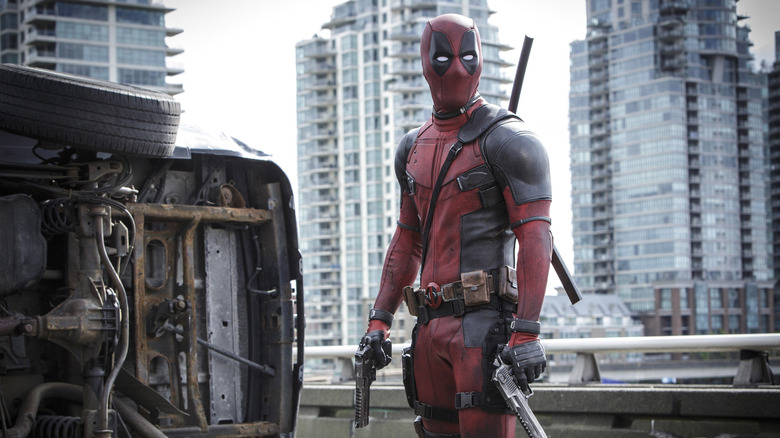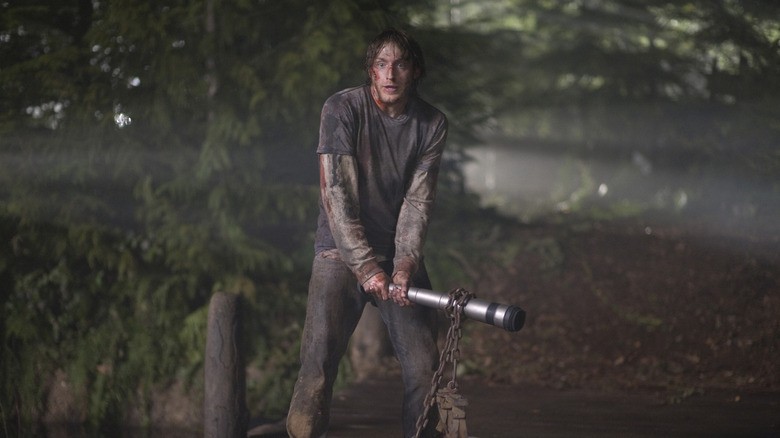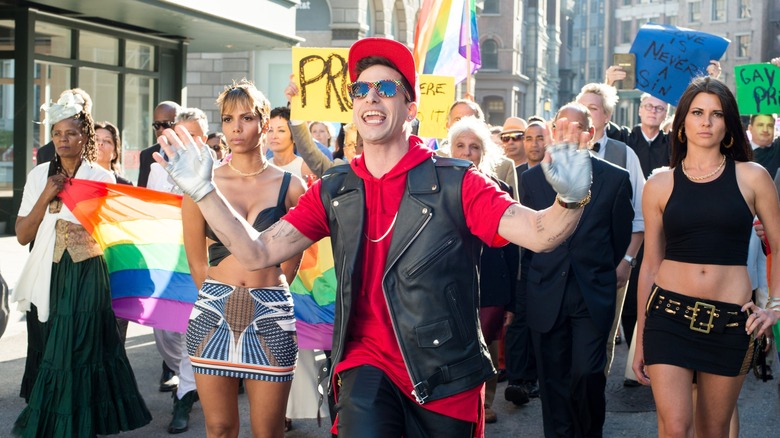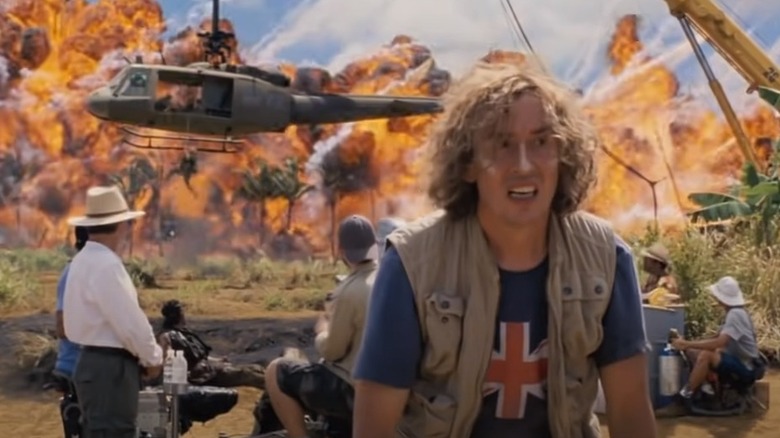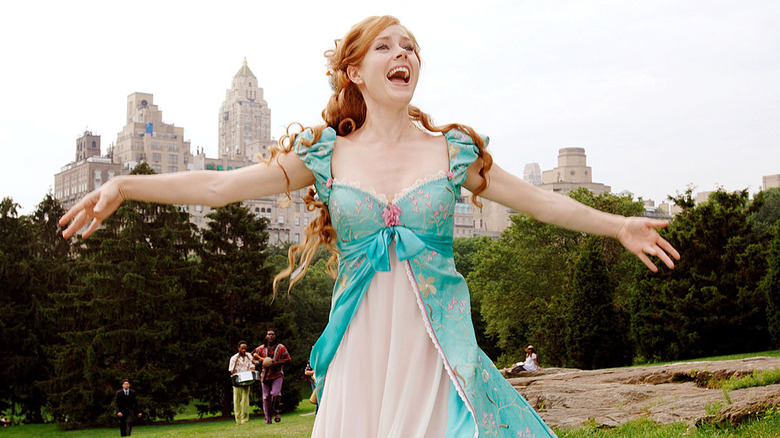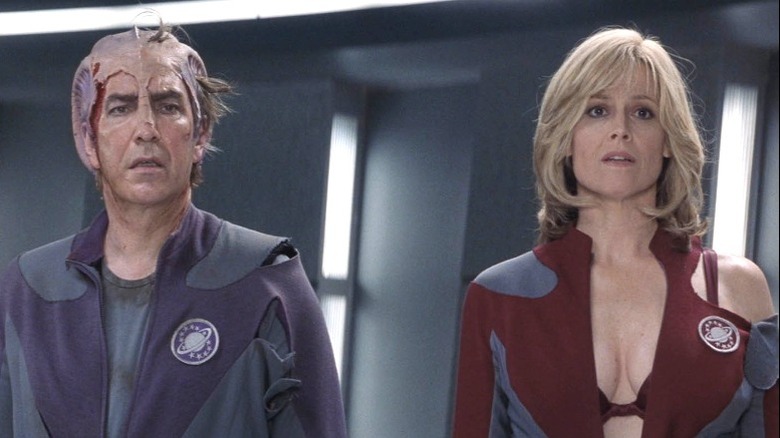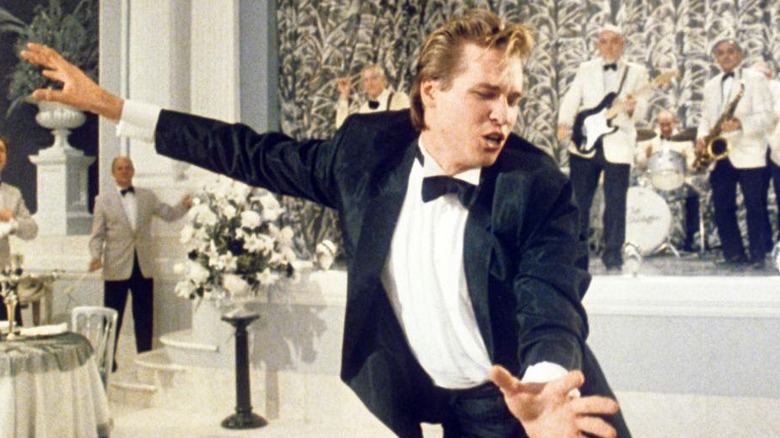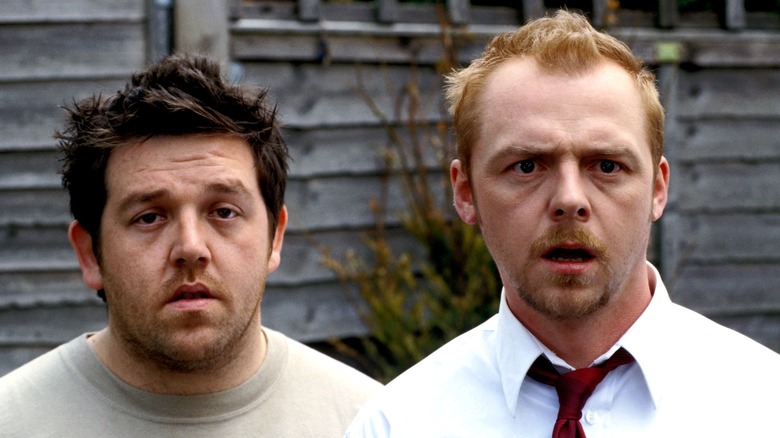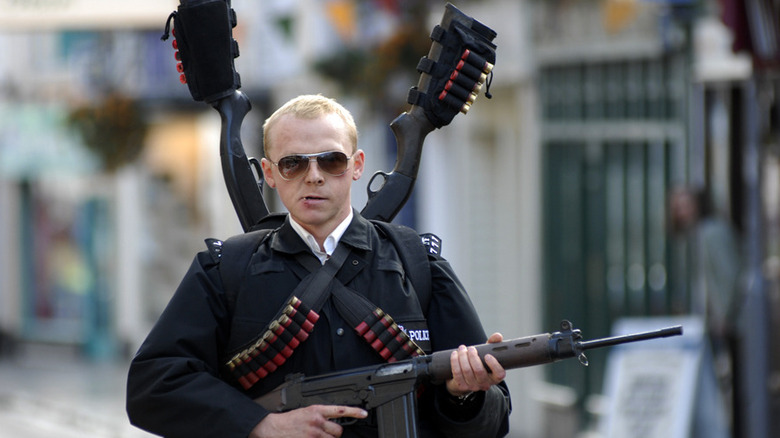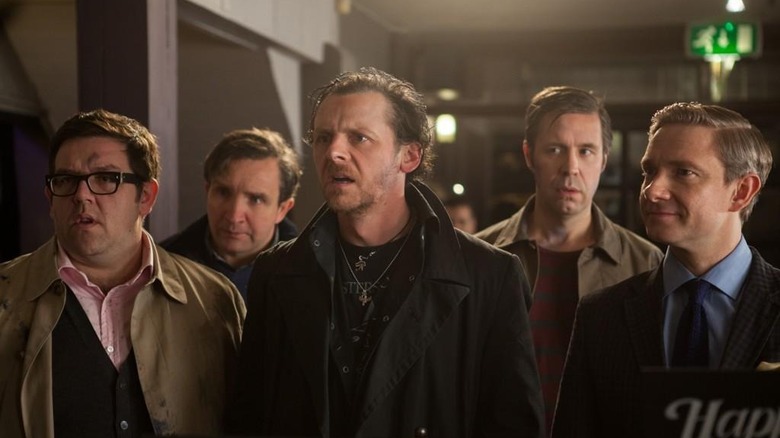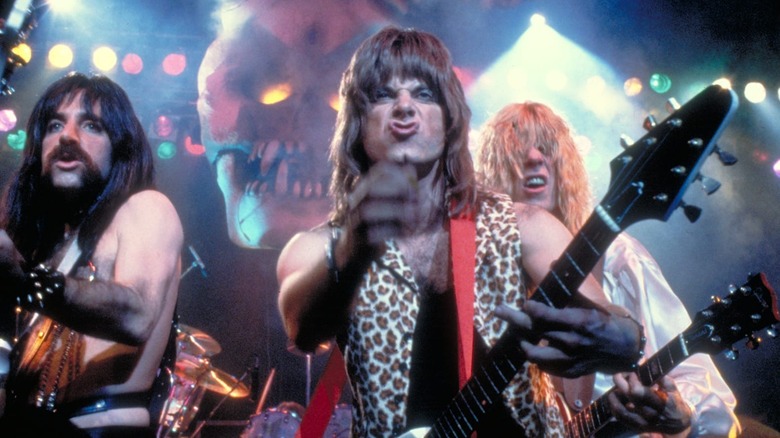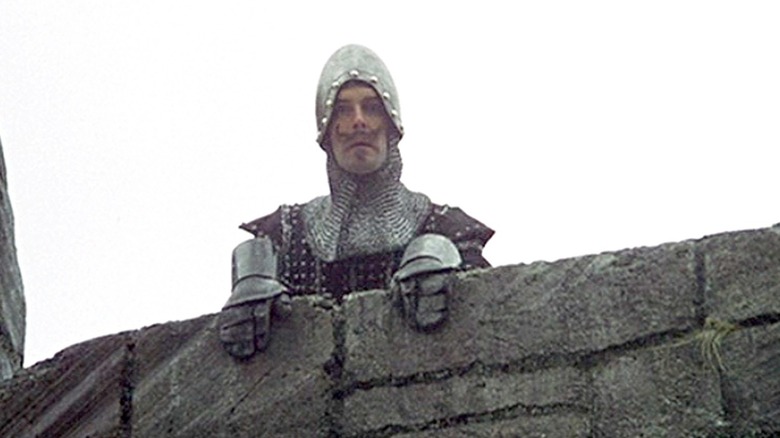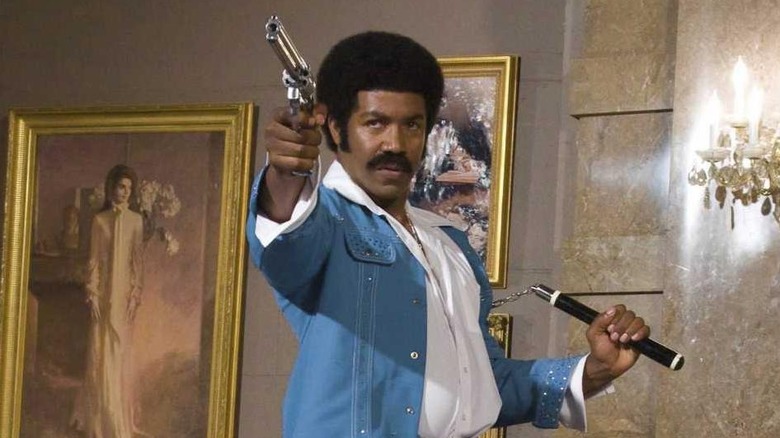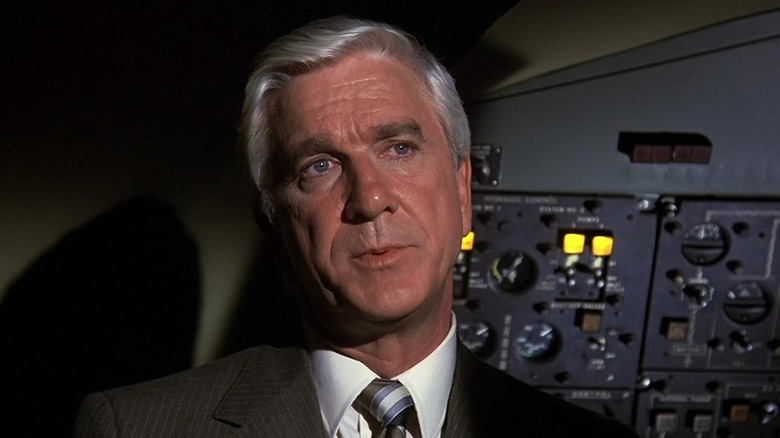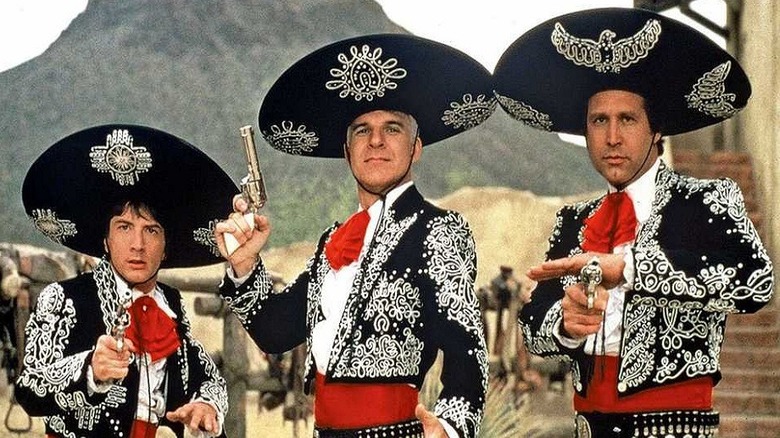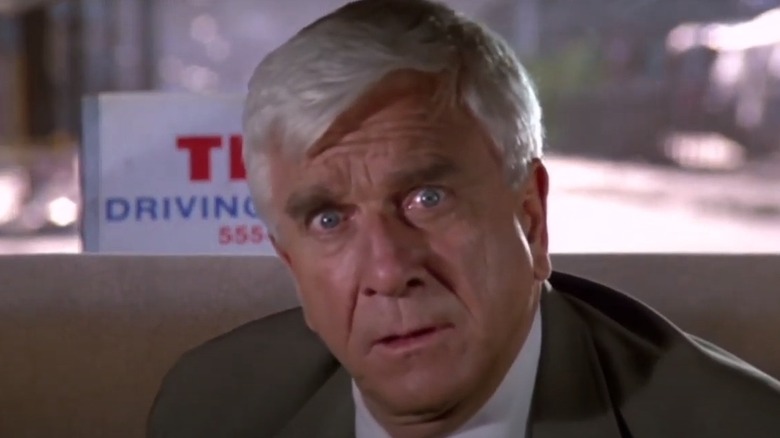The 20 Greatest Parody Movies In Cinema History
It's very disheartening to see how parody movies have declined in the past few decades. Franchises like "A Haunted House" or "Scary Movie" are no longer funny, and they don't understand what spoofs need to do to be clever. A parody isn't defined by the number of current pop culture references or celebrity cameos it can fit in. At their best, parody movies should be able to offer insights into why a genre is worth poking fun at.
The internet era has certainly made it more challenging to come up with original gags. Filmgoers are overexposed to late-night jokes, "Saturday Night Live" sketches, satirical film reviews, and an overabundance of cynicism on social media platforms. By the time that Wade Wilson threw in a one-liner mocking the "Save Martha" scene from "Batman v. Superman: Dawn of Justice" in "Deadpool 2," it felt two years behind the curve.
A few easy jokes about something popular don't make a great movie. In fact, the best parody movies should stand independently so someone unfamiliar with the source material can still enjoy it.
Here are the 20 greatest parody movies in cinema history.
Blazing Saddles
Mel Brooks aimed his razor-sharp wit at the Western movie genre in 1974 with his spoof "Blazing Saddles." At this point, the Western had been established for generations. Westerns had evolved and matured since their earliest days. More reflective films like "Once Upon A Time In The West" and "The Man Who Shot Liberty Valance" had already deconstructed the genre. That made it more challenging to say something new with a genre that audiences were already so familiar with.
"Blazing Saddles" isn't recreating just one specific Western. Similar to classics like "High Noon," "Rio Bravo," and "Shane," the story features a brave sheriff in a lawless town. The volatile town of Rock Ridge is set to be the site of a new railroad line. Territorial Attorney General Hedley Lamarr (Harvey Korman) realizes he can profit off of the new expansion. He decides to get the current residents to abandon their homes by sending in a Black sheriff.
Sheriff Bart (Cleavon Little) is dispatched to the city and is immediately met with racist backlash from the citizens. Bart treats his position with optimism and forms a friendship with the alcoholic gunslinger known as The Waco Kid (Gene Wilder). They work together to clean up the streets.
Young Frankenstein
"Frankenstein" is one of the most iconic horror movies in cinematic history. James Whale's 1931 classic was the template for the genre, and Whale's follow-up, "The Bride of Frankenstein," has just as many famous moments. Universal Pictures brought back Frankenstein's monster in subsequent sequels, spinoffs, and crossovers with characters like Dracula, the Wolf Man, and even Abbott and Costello. In 1957, Peter Cushing and Christopher Lee took on the story in Hammer Films' "The Curse of Frankenstein." There have also been many television adaptations of Mary Shelley's famous novel. Audiences certainly couldn't be blamed if they were sick of hearing the words "It's alive!"
Mel Brooks decided to take on the story in 1974 — the same year as "Blazing Saddles." "Young Frankenstein" centers on Victor Frankenstein's embarrassing grandson, Dr. Frederick Frankenstein (Gene Wilder). Frederick inherits his family's estate in Transylvania and meets a descendant of the famous "Frankenstein" character Igor (Marty Feldman). He begins performing the same experiments that his ancestor became notorious for. Eventually, Frederick creates his own monster (Peter Boyle).
Ironically, this sillier interpretation was the most original take on "Frankenstein" in years. It's easy to forget that the "Frankenstein" story is inherently tragic. Brooks mocks Frankenstein's crazed concepts but also gives him a compelling reason to pursue them. Frederick isn't taken seriously by the scientific community and has something to prove. He shows genuine affection for his monstrous creation.
Spaceballs
"Star Wars" has always been a dominant cultural presence. George Lucas' science fiction movie introduced a new era of blockbuster filmmaking that changed the course of Hollywood history. Studios were desperate to find the next "Star Wars." The series risked overexposure because there were many comedic interpretations already. Everything from "Donnie and Marie" to "The Muppet Show" poked fun at the galaxy far, far away.
Nevertheless, Mel Brooks decided to take a stab at "Star Wars" in 1987. "Spaceballs" mocks many popular films and franchises, including "Star Trek," "Indiana Jones," "Aliens," "The Wizard of Oz," "Planet of the Apes," and even "2001: A Space Odyssey." However, it is primarily a "Star Wars" parody. The film follows space mercenary Lone Star (Bill Pullman), who is a bit of a combination of Luke Skywalker and Han Solo. Lone Star and his loyal half-human, half-dog companion Barf (John Candy's version of Chewbacca) are offered a reward to rescue Princess Vespa (Daphne Zuniga) of the planet Druidia. Vespa is set to be married to the idiotic Prince Valium (Jim J. Bullock).
Lone Star must avoid the villains of the planet Spaceball's evil empire, including Dark Helmet (Rick Moranis), Colonel Sandurz (George Wyner), and President Skroob (Brooks). Brooks lampoons "Star Wars" with lots of fun parallels like "the Schwartz," the "Spaceballs" version of the Force.
Austin Powers: International Man of Mystery
The James Bond films aren't the highest-grossing film franchise of all time, but they have been a consistent moneymaker for six decades. Bond first appeared on the big screen in 1962's "Dr. No," and audiences have come to expect a new 007 adventure every few years. There's no indication that the series will end anytime soon. Just last year, Daniel Craig's final adventure as 007, "No Time To Die," managed to rake in impressive box office results and earn critical praise after being delayed due to COVID-19.
Each new Bond film is a product of its era. The series is reimagined and rebooted every time a new actor steps into the role. When you consider the movies inspired by Bond, it is challenging to think of any new takes on the cinematic spy. However, Mike Myers was able to craft a loving, quirky homage with 1997's "Austin Powers: International Man of Mystery." Not only did Myers mock the familiar cliches of the Bond series, but he also explored the hilarious consequences of bringing a character from the swinging '60s into the modern day.
In the film, Myers takes on the dual roles of world-class secret agent Austin Powers and the eccentric villain Dr. Evil. Both characters are hilariously incompetent. Ironically, Myers created parody characters that were just as worthy of revisiting as Bond and Blofeld. With the subsequent films, "Austin Powers: The Spy Who Shagged Me" and "Austin Powers in Goldmember," this is one of the few comedic franchises with sequels as good as the original.
Deadpool
Despite what the great Steven Spielberg might say, superhero movies aren't going away any time soon. The genre has always been popular, but in the past decade, comic book-inspired movies have become a dominant form of entertainment. They continue to top the box office charts every year. There's no sign that the Marvel Cinematic Universe is slowing down, and DC continues to expand its filmography with both the DC Extended Universe and offshoot projects set outside of its connected continuity. The genre is popular with comic book fans and critics alike. Films like "Logan," "Black Panther," and "Joker" became major awards contenders.
2016 was a pivotal year for superhero movies thanks to "Captain America: Civil War" and "Batman v. Superman: Dawn of Justice." Compared to these two huge crossovers, the modestly-budgeted "Deadpool" was an underdog. Still, the foul-mouthed mercenary with a heart of gold succeeded. The comedic slant of "Deadpool" was exactly what the genre needed. The film mocks the archetypes of the genre, but it still works as an awesome R-rated action-comedy in its own right.
Like "Batman Begins" and "Iron Man," "Deadpool" features a non-linear narrative framing device. Ryan Reynolds' Wade Wilson has an engaging and tragic origin story that makes him consistently interesting. It's also just refreshing to see a superhero who actually loves his job.
The Cabin in the Woods
Parody movies are often loving tributes from filmmakers honoring their influences. It's nice to see spoofs that genuinely celebrate a genre and remind us why it's worth revisiting. However, there's also room for spoof films that take a more critical stance. A great parody can examine the cliches it's subverting. Comedy can make a meaningful statement without being mean-spirited or dismissive.
"The Cabin in the Woods" is both an homage and deconstruction of many subgenres of horror. It initially unfolds in a way similar to low-budget gore movies like "Evil Dead" or "Bad Taste." It also incorporates elements of slasher films, monster movies, conspiracy thrillers, and torture porn. For fans of the genre, it's fun to see references to the vast history of horror cinema. However, screenwriters Drew Goddard and Joss Whedon also question the appeal of violence and examine horror movie fan culture. "The Cabin in the Woods" is particularly critical of the negative stereotypes of women and minority characters in horror movies.
The film follows six college friends who take a road trip vacation to the titular cabin in the woods. Each character represents a different horror movie archetype: Dana Polk (Kristen Connolly) is "The Virgin," Curt Vaughan (Chris Hemsworth) is "The Jock," Jules Louden (Anna Hutchinson) is "The Whore," Marty Mikalski (Fran Kranz) is "The Fool," and Holden McCrea (Jesse Williams) is "The Scholar." With some unforeseen twists and turns, "The Cabin in the Woods" cleverly explains why the story plays out in such a seemingly cliched way.
Popstar: Never Stop Never Stopping
In the 21st century, there have been many music documentaries and concert films focusing on current pop icons. Obviously, these films are aimed at younger audiences, but there is something that feels fake about the way these films are presented. Docs like "Justin Bieber: Never Say Never" or "Katy Perry: Part of Me" feel like manufactured products from marketing departments. Sometimes, it seems like the days of truly great music documentaries like "Bob Dylan: Don't Look Back," "Monterey Pop," or "The Last Waltz" are long gone.
The talented team at Lonely Island decided to take down the pop doc trend in 2016 with their mockumentary, "Popstar: Never Stop Never Stopping." The film centers on pop sensation Conner4real (Andy Samberg), formerly known as "Kid Conner." In the film, Conner is venturing off on a major solo tour after abandoning his former bandmates, The Style Boyz. His childhood friend, Owen (Jorma Taccone), once known as "Kid Contact," is now his relatively useless DJ, and Conner mostly ignores him. Lawrence (Akiva Schaffer), the former "Kid Brain," leaves the industry entirely to become a farmer in the middle of nowhere.
"Popstar: Never Stop Never Stopping" doesn't just lampoon music culture. It features a great soundtrack of its own. Original tunes like "Incredible Thoughts," "I'm So Humble," "Karate Guy," and "Mona Lisa" playfully mock popular music trends.
Tropic Thunder
Great parodies have the opportunity to not only lampoon famous movies but also the people that made them. There are reasons why trends emerge, and it is important to question why these trends are still popular. Are they simply a product of creative laziness or just Hollywood cynicism? Can a true artist inadvertently take on cliched material? Should we as viewers be empathetic to them? Is it okay to mock someone's hard work and creative vision because they're an out-of-touch Hollywood celebrity? These are questions that parodies often don't think to ask.
However, Ben Stiller did ask those questions in 2008 with his satirical action-comedy, "Tropic Thunder." Stiller had already worked in the industry for quite a while, both in front of and behind the camera. His perspective boosts the insights that "Tropic Thunder" has on the film production process. Stiller stars as Tugg Speedman, an action movie star renowned for his "Scorcher" series of films. Tugg had become a laughing stock within the industry with his failed Oscar bait project, "Simple Jack." In the film, he tries to regain his dignity by starring in a major war film that is similar to "Platoon" or "Apocalypse Now."
Tugg joins a cast that includes lazy comedian Jeff Portnoy (Jack Black), method actor Kirk Lazarus (Robert Downey Jr.), up-and-comer Kevin Sandusky (Jay Baruchel), and rapper Alpa Chino (Brandon T. Jackson). The ensemble heads to Vietnam for an ambitious shooting schedule and are put in actual danger.
Enchanted
The parody genre is often associated with crass R-rated comedies that feature overt sexuality and foul language. It makes sense for parodies to be aimed at older viewers. Adults have simply seen more movies than children and are more familiar with trends. However, there certainly are stories that children have seen more than once. Disney has been cranking out fairy tale movies for most of its history, and most kids have probably seen more than their share.
As a result, 2007's "Enchanted" can tell a parodical story for a family audience. There's a goofiness in "Enchanted" that appeals to children, but there's also a more subtle meta-commentary on the familiar princess archetype for older viewers. The film opens with an animated sequence set in a mythical fairy-tale land. The naive Princess Giselle (Amy Adams) falls in love with the brave (but not that bright) Prince Edward (James Marsden). Giselle's wicked stepmother, Queen Narissa (Susan Sarandon), casts a curse and transports Giselle to modern-day New York.
Giselle finds herself trapped in an environment where her idealism is out of touch. Cynical divorce attorney Robert Phillip (Patrick Dempsey) takes pity on her when he sees how scared she is. He offers her the chance to stay with him and his daughter. Edward may have swept her off her feet, but Giselle gradually falls in love with Robert.
Galaxy Quest
"Star Trek" has a fascinating fan culture. You may be sick of hearing the phrase "it was all for the fans," but "Star Trek" was truly saved by its loyal fanbase. An enthusiastic letter-writing campaign prevented the original series from cancellation. "Star Trek" fans are notoriously loyal. Convention culture is an essential part of the saga's history, so fans are often privy to the private lives of their favorite stars.
1999's "Galaxy Quest" is a loving tribute to both "Star Trek" and its fans. The film imagines a cult science fiction series called "Galaxy Quest" that is similar to the original "Star Trek" series. Despite its limited television run, "Galaxy Quest" has a strong cult following. The out-of-work actors from the show now make their living by attending conventions and appearing on panels. The egocentric stars have grown to despise each other. Jason Nesmith (Tim Allen) is "Galaxy Quest's" version of William Shatner. His haughty behavior has worn thin on castmates Gwen DeMarco (Sigourney Weaver), Alexander Dane (Alan Rickman), Fred Kwan (Tony Shalhoub), Tommy Webber (Daryl Mitchell), and extra-turned-cast-manager Guy Fleegman (Sam Rockwell).
The crew is forced to bond when a real alien species seeks their help. Threatened by an invading race led by the evil Roth'h'ar Sarris (Robin Sachs), the naive Thermian people have misinterpreted episodes of "Galaxy Quest" as real historical documents.
Top Secret!
It's interesting when parody films combine multiple genres into a broader satire. It diversifies the humor within the film and gives the audience a unique experience. Merging multiple genres may not make logical sense in a more dramatic story, so a parody version is perfect. It gives filmmakers the chance to be more creative. A more diverse group of film fans may be interested because of all the different influences.
The 1984 action-comedy "Top Secret!" combines the espionage, World War II, Cold War thriller, and musical genres into one quirky adventure. The film opens as a fairly straightforward parody of Elvis Presley's films. It takes a comedic look at a '50s-style rock and roll musician named Nick Rivers (Val Kilmer). Rivers' international tour takes him to East Germany. Other genres emerge in the hilarious narrative, as Cold War paranoia and lasting World War II tensions are still present in East Germany.
Rivers charms the local rebel leader, Hillary Flammond (Lucy Gutteridge), with his rendition of "Tutti Frutti" at a lavish dinner party. He ends up saving her from being captured. Rivers learns that she's involved with a movement to prevent the rise of former Nazis. Inspired by her heroism, Rivers decides to join her mission. "Top Secret!" expertly combines action and humor. The character of Rivers is surprisingly dynamic compared to Elvis' dim-witted characters. Rivers finds creative solutions to help the resistance movement and constantly surpasses everyone's expectations. "Top Secret!" features an incredible debut performance from Kilmer, and it helped launch him as a major star.
Shaun of the Dead
Zombie films had grown into a tired subgenre by the early 21st century. "28 Days Later" may have changed the game with its fast-moving zombies, but most movies about the undead were stuck repeating the same formula that George Romero had already perfected. Romero's "Night of the Living Dead," "Dawn of the Dead," and "Day of the Dead" are foundational within the genre. They set a high precedent for excellence, and it was hard for other films to distinguish their vision of a zombie apocalypse in an original way.
When Edgar Wright took on the genre with "Shaun of the Dead," he didn't just make a loving tribute to Romero. The film has great (and very bloody) practical zombie effects. The zombies themselves were more effective than anything horror fans had seen in years. Few horror-comedies are equally funny and scary. "Shaun of the Dead" is a rare exception and perfectly combines Wright's fast-paced humor with some truly sickening death sequences. Wright understands that, in addition to being scary villains, zombies are a metaphor for their living counterparts. He satirizes how mankind has already become the living dead by doing the same menial tasks every day.
"Shaun of the Dead" is also a great character study. Torn between his slacker best friend, Ed (Nick Frost), and his level-headed girlfriend, Liz (Kate Ashfield), Shaun (Simon Pegg) is initially a bit immature and stuck in a rut. The zombie pandemic gives him the chance to become a hero.
Hot Fuzz
After the success of "Shaun of the Dead," Edgar Wright and his stars Simon Pegg and Nick Frost parodied buddy cop action movies with "Hot Fuzz." "Hot Fuzz" may be making fun of many types of action movies, but at its heart, it's a story of friendship. The film follows two polar opposite characters as they discover they have much more in common than they initially expected. Like "Shaun of the Dead," "Hot Fuzz" isn't just a winking parody. It's an effective genre film in its own right. The action sequences are top-notch and incorporate Wright's fast-paced humor.
"Hot Fuzz" follows the notoriously serious London cop Nicholas Angel (Pegg) as he solves major crimes in the city. Angel is closed off from any personal relationships with his squad. As effective as he is, Angel's superiors dislike how he's shames the rest of the department with his overperformance. They decide to reassign him to the quiet, quirky small town of Sandford.
Angel quickly grows annoyed with the Sandford police force. He's particularly irritated when he's assigned to partner up with geeky rookie officer Danny Butterman (Frost). They grow closer throughout the adventure as Danny teaches Angel a different type of police work. Angel is initially disappointed by the lack of apparent criminal activity in Sandford. However, a series of unexplained deaths lead him and Danny to uncover a conspiracy engineered by the town's long-time residents.
The World's End
"The World's End" is the third film in Wright, Pegg, and Frosts' "Cornetto Trilogy." It is both the funniest and the most mature film of the series. "The World's End" has elements of science fiction films like "The Stepford Wives," "The Quatermass Xperiment," and "Invasion of the Body Snatchers." However, the "one wild night" story is similar to comedies like "Go," "After Hours," or even "Adventures in Babysitting." Wright turns these wildly different influences into a surprisingly nuanced character commentary. He explores nostalgia, alcoholism, and aging. If "Shaun of the Dead" and "Hot Fuzz" succeed as both hilarious parodies and genuine genre classics, "The World's End" creates something completely new.
Slacker Gary King (Simon Pegg) lives in the shadow of the dubious glory of a youthful drinking escapade from his high school years. Gary is still proud that he and his friends nearly completed a pub crawl called "The Golden Mile." His friends, however, have moved on with their lives. Under false pretenses, Gary gathers his old buddies, Andy Knightley (Frost), Steven Prince (Paddy Considine), Oliver Chamberlain (Martin Freeman), and Peter Page (Eddie Marsden). He plans to return to their hometown to finally complete "The Golden Mile."
In a night of heavy drinking, the gang discovers that their familiar stomping grounds are more sinister than they remember. Each man is haunted by demons from their past, and they find that the town's residents have been replaced by robot lookalikes.
This Is Spinal Tap
Some films transcend being parodies and leave a legacy that lasts even longer than what they're mocking. "This Is Spinal Tap" was inspired by music documentaries like "The Last Waltz." However, the film features characters that have become iconic in their own right. Rob Reiner treats the film as a serious documentary about a fictional group of musicians. Their experiences give surprising insights into the music culture of the era.
The eccentric titular band Spinal Tap consists of vocalist David St. Hubbins (Michael McKean), guitarist Nigel Tufnel (Christopher Guest), bass player Derek Smalls (Harry Shearer), keyboardist Viv Savage (David Kaff), and drummer Mick Shrimpton (R.J. Parnell). The characters feel like exaggerated versions of popular '70s and '80s musicians. Reiner also co-stars as the fictional documentarian Marty Di Bergi. Marty films the band's misadventures during a national tour. Filled with some great (and hilarious) tunes, "This is Spinal Tap's" soundtrack is a classic.
Monty Python and the Holy Grail
A parody film should be more than a loose collection of sketches. However, a sketch group still has what it takes to spice up the genre. The British comedy troupe Monty Python created a unique form of clever humor in their classic skits. In 1975, they translated their absurd sensibilities into a narrative feature. "Monty Python and the Holy Grail" plays like a loving send-up of Arthurian legends and medieval movies in general.
The film retells the classic story of the legendary search for the Holy Grail, but these Knights of the Round Table are complete idiots! When King Arthur (Graham Chapman) is called upon by God to retrieve the relic, he brings along Sir Lancelot (John Cleese), Sir Robin (Eric Idle), Sir Bedevere (Terry Jones), Sir Gallahad (Michael Palin), and his loyal squire Patsy (Terry Gilliam) on a seemingly noble quest to Castle Aarrgh. The film makes fun of low-budget medieval films with its comically cheap-looking special effects.
Black Dynamite
Great parodies don't just mock story. It's always more interesting when a parody examines the era in which its subject was produced and points out how things like production values, casting, and technical competence have changed. "Black Dynamite" is a hilarious send-up of '70s movies blaxploitation, particularly 1971's "Shaft." Like the films it lampoons, "Black Dynamite" features comically incompetent sets, poorly edited action sequences, and the use of stock footage and repeated shots. There are even instances where the boom mic appears in the frame.
Michael Jai White stars as the exaggerated action hero Black Dynamite. Black Dynamite is somehow the world's greatest cop, martial arts expert, soldier, CIA agent, and community hero all at once. His hilarious overabundance of skills makes him an absurdly perfect hero. Black Dynamite is selected to lead an investigation into a new drug sweeping the streets, and his wild adventures take him all the way to Richard Nixon's White House.
Airplane!
The disaster movie genre has managed to stick around for decades. This generation has Roland Emmerich's filmography, but disaster films were particularly popular in the '70s. Hits like "Airport," "The Towering Inferno," "Earthquake," and "The Poseidon Adventure" dominated the era. Most disaster movies are already pretty ridiculous. Thankfully, all the laughs from the classic comedy "Airplane!" are intentional.
"Airplane!" follows a packed flight from Los Angeles to Chicago that descends into a crisis. The crew and passengers begin feeling the effects of food poisoning during a particularly chaotic storm. With the pilots incapacitated, the idiosyncratic Dr. Rumack (Leslie Nielson) takes charge as things get worse and worse.
Ironically, "Airplane!" has more engaging motivations for its leading characters than most actual disaster films. War veteran Ted Striker (Robert Hays) boards the flight at the last minute to pursue his girlfriend, flight attendant Elaine Dickinson (Julie Hagerty). Ted's romantic pursuits are relatable and help balance out the constant one-liners.
Three Amigos
"Three Amigos" is a great parody because it features the people least equipped to be real heroes: highly paid Hollywood stars. No group in Hollywood is more deserving of a roast than lazy, egocentric actors. It's fun to see a parody film that looks at how disconnected from reality these popular stars can be.
Silent film actors Lucky Day (Steve Martin), Dusty Bottoms (Chevy Chase), and Ned Nederlander (Martin Short) star in a popular Western adventure series called "The Three Amigos!" They are mistaken for actual gunslingers by the villagers of the poor Mexican village of Santo Poco. The impoverished town is threatened by the outlaw El Guapo (Alfonso Arau) and his bandits. After getting fired from their studio, Lucky, Dusty, and Ned travel to Santa Poco, mistakenly misreading the pleas of the town as an acting gig. They are stranded upon arrival and must become the heroes that they've been pretending to be.
The Naked Gun: From The Files of Police Squad!
Genre parodies are popular in both cinema and on television. The 1982 "Police Squad!" TV series from David Zucker lampooned procedural police shows with its comedic version of a Lee Marvin-esque detective — Leslie Nielsen's Lieutenant Frank Drebin. "Police Squad!" established a world and characters well worth revisiting, but the show was tragically canceled after one season.
Just as many serious cop shows have made the transition to the big screen, Zucker was able to bring back Drebin for the 1988 feature film "The Naked Gun: From The Files of Police Squad!" You don't need any knowledge of the series to appreciate how the film mocks overtly serious police characters and convoluted criminal conspiracies. The bluntness of Nielsen's performance is perfectly balanced with surreal gags. Drebin is a comedic character with unusual depth, and he returns for the sequels "The Naked Gun 2 1⁄2: The Smell of Fear" and "Naked Gun 33 1⁄3: The Final Insult."
